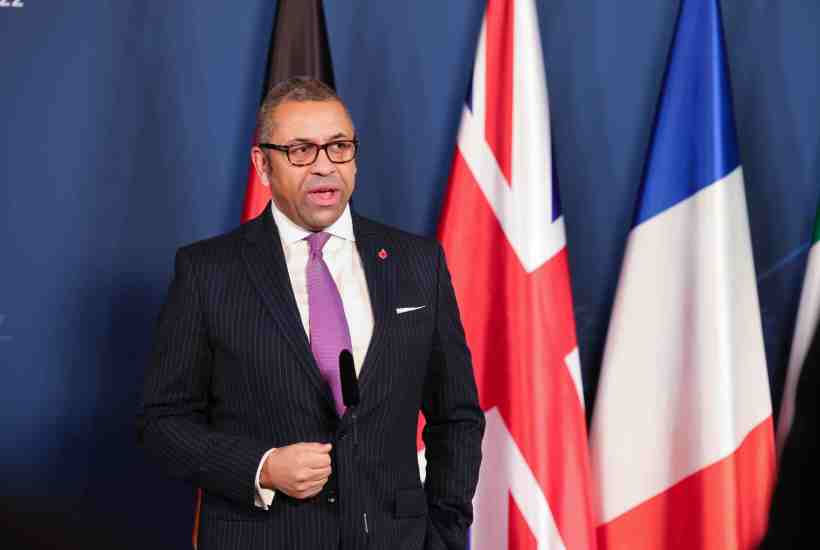What a difference a year makes. Three prime ministers ago, in April 2022, Liz Truss gave a characteristically punchy speech at Mansion House as Foreign Secretary. Grouping Beijing with Moscow into a club of ‘aggressors’ with ‘malign tactics’, she reiterated her pledge to create a ‘network of liberty’, bringing together like-minded, liberal and democratic countries to face down ‘the bullies’.
Tonight’s speech from her successor at the Foreign Office signalled a significant softening. Foreign Secretary James Cleverly tilted towards strategy and pragmatism, reiterating the message of last month’s updated Integrated Review. He called for engagement, but only on the basis of British national interest, while arguing that security should still trump all. ‘If you are looking for British foreign policy by soundbite, you will be disappointed’, he said.
So Brits should care about peace in Taiwan, not necessarily because it’s a democratic country, but because a war in the region would ‘destroy world trade worth $2.6 trillion’. We should ally with Japan and other Indo-Pacific powers, not because they are liberal nations but because ‘China is carrying out the biggest military build-up in peacetime history’. And in critical areas like telecoms and semiconductors, involvement from Chinese companies are blocked on grounds of ‘national security’ rather than just because they come from an authoritarian state. Instead of Truss’s binary world delineated by political values, Cleverly tried to draw out the boundaries of British interest and their implications for policy.
This is a worthy endeavour, but easier said than done. The UK has been trying to calibrate its approach to a rising China for more than a decade now, and it’s been burnt before. The Osborne-Cameron golden era (even as Xi Jinping was cementing his power domestically) is hard to see as anything other than naivety now. At the same time, Truss’s hostility to China was such that the Foreign Office under her was kneecapping British expertise on China for fear of foreign infiltration.
Aiming for somewhere between these two extremes is surely the considered thing to do. (Cleverly’s own views seem to have shifted too, given he’d first become Foreign Secretary under Truss.) But here’s the challenge: neither his speech nor the updated Integrated Review demonstrate enough thinking on exactly what Britain’s interests are vis a vis China, and therefore where its red lines for engagement lie. It’s fine to call for nuance and an end to soundbites, but what does that mean in reality?
Cleverly suggests that British businesses should still go to China, but at what point should we be concerned about their vulnerability to the whim of the Chinese Communist Party? The Foreign Office assumes that it can influence Beijing’s decisions by staying in the room, but have we really seen evidence that the Chinese respond better to polite entreaties than targeted sanctions? And if China is so important to engage with, how will Britain’s approach change if Beijing sidles even closer to Russia?
These are the hard questions that a ‘China strategy’ could help answer. Long called for by some foreign policy wonks and former diplomats, this document would set out, in more detail than the Integrated Review, exactly where Britain’s red lines with Beijing would lie. But no such document seems to exist yet, nor does there seem to be any confirmation that Whitehall is thinking about it with any urgency.
As a result, Britain’s approach to China seems doomed to be ad hoc, reactionary to the latest campaigns by concerned MPs. Take the furore over TikTok: despite initial refusal to ban the app on government devices, No. 10 eventually relented to backbench pressure, especially as other western governments went the same way. The U-turn seemed to come less from a considered and consistent approach based on an understanding of Chinese-affiliated companies (and how they impact British interests), and more as a result of reacting to a febrile news cycle.
And a final thought. Cleverly’s speech has angered some China hawks, in parliament and elsewhere, by decrying a new Cold War (‘It would be clear and easy – and perhaps even satisfying – for me to declare a new Cold War… Clear, easy, satisfying – and wrong’). But China already sees the US and UK’s Indo-Pacific tilt (including but not limited to Aukus) as Cold War-style containment and has said as much. Meanwhile, America has designed monumental industrial policies like the Chips Act and the Inflation Reduction Act with a tech arms race in mind. In truth, whether there’s a second Cold War depends much more on the actions and reactions in Beijing and Washington, than it does on the latest British foreign secretary.
Got something to add? Join the discussion and comment below.
Get 10 issues for just $10
Subscribe to The Spectator Australia today for the next 10 magazine issues, plus full online access, for just $10.















Comments
Don't miss out
Join the conversation with other Spectator Australia readers. Subscribe to leave a comment.
SUBSCRIBEAlready a subscriber? Log in